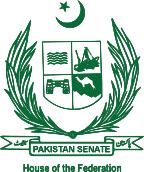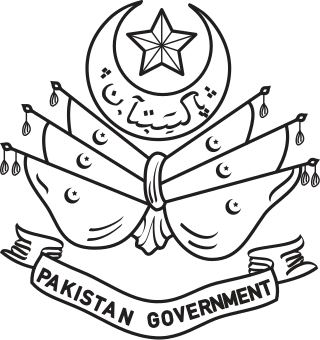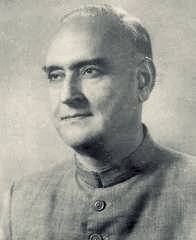Related Research Articles

The Senate of Pakistan, constitutionally the House of the Federation, is the upper house of the bicameral Parliament of Pakistan. As of 2023, It has a maximum membership of 96, of which 92 are elected by the provincial legislatures using single transferable vote; four represent the federal capital. Members sit for terms lasting six years, with half of the house up for election every three years. Unlike the National Assembly, the Senate is a continuing chamber and hence not subject to dissolution.

The National Assembly of Pakistan is the lower house of the bicameral Parliament of Pakistan, with the upper house being the Senate. As of 2023, the National Assembly has a maximum membership of 336, of which 266 are directly elected by an adult universal suffrage and a first-past-the-post system to represent their respective constituencies, while 60 are elected on reserved seats for women and religious minorities from all over the country. Members hold their seats for five years or until the house is dissolved by the President on the advice of the Prime Minister. The house convenes at the Parliament House, Red Zone, Islamabad.

The Parliament of Pakistan is the supreme legislative body of the Islamic Republic of Pakistan. It is a bicameral federal legislature, composed of the President of Pakistan and two houses: the Senate and the National Assembly. The president, as head of the legislature, has the power to summon or prorogue either house of the Parliament. The president can dissolve the National Assembly, only on the Prime Minister's advice.

Sir Tej Bahadur Sapru was an Indian freedom fighter, lawyer, and politician. He was a key figure in India's struggle for independence, helping draft the Indian Constitution. He was the leader of the Liberal party in British-ruled India.

Constituent Assembly of India was partly elected and partly nominated body to frame the Constitution of India. It was elected by the Provincial assemblies of British India following the Provincial Assembly elections held in 1946 and nominated by princely states. After India's independence from the British in August 1947, its members served as the nation's 'Provisional Parliament', as well as the Constituent Assembly. It was conceived and created by V. K. Krishna Menon, who first outlined its necessity in 1933 and enshrined it as an Indian National Congress demand.

The Constituent Assembly of Pakistan was established in August 1947 to frame a constitution for Pakistan. It also served as its first interim parliament. It was dissolved by the Governor-General of Pakistan in 1958.

The Federal Parliament of Nepal is the bicameral federal and supreme legislature of Nepal established in 2018. It consists of the National Assembly and the House of Representatives as parallel houses.

The East Pakistan Provincial Assembly, known as the East Bengal Legislative Assembly between 1947 and 1955, was the provincial legislature of East Pakistan between 1947 and 1971. It was known as the East Bengal Assembly from 1947 to 1955 when the provincial name was changed. The legislature was a successor to the Bengal Legislative Council and the Bengal Legislative Assembly, which were divided between East Bengal and West Bengal during the partition of Bengal in 1947. It was the largest provincial legislature in Pakistan. Elections were held only twice in 1954 and 1970.

Shabbir Ahmad Usmani Born in 1887 in Bijnor, Usmani was an alumnus of Darul Uloom Deoband. He was the son of Fazlur Rahman Usmani. His brother Azizur Rahman Usmani was the first Grand Mufti of Darul Uloom Deoband. Usmani was the first to hoist the Flag of Pakistan at Karachi on 14 August 1947, and led the funeral prayers of Muhammad Ali Jinnah. His major work is the Tafseer-e-Usmani, which he co-authored with his teacher Mahmud Hasan Deobandi.

Al-Hajj Abd-Allah Zaheeruddin Moazzem Hossein Chowdhury, popular known as Lalmia, was a Bengali Muslim politician. He represented Faridpur District in the Bengal Legislative Council, the Constituent Assembly of Pakistan, and National Assembly of Pakistan. He was Pakistan's federal Minister of Health, Social Welfare and Labour in the cabinet of Ayub Khan.

The history of East Bengal and East Pakistan from 1947 to 1971 covers the period of Bangladesh's history between its independence as a part of Pakistan from British colonial rule in 1947 to its independence from Pakistan in 1971.
The Constitution of 1956 was the fundamental law of Pakistan from March 1956 until the 1958 Pakistani coup d'état. It was the first constitution adopted by independent Pakistan. There were 234 articles, 13 parts and 6 schedules.

The Basic Principles Committee (BPC) was a specialized committee set up in March 1949 by Khawaja Nazimuddin on the advice of prime minister Liaquat Ali Khan. The committee's sole purpose was to determine the basic underlying principles that would determine future constitutions and legislature in Pakistan.

Nibaran Chandra Laskar was an Indian singer, musician, sportsman, social worker, professor and politician. He was a member of the Indian National Congress party. He was elected to the Lok Sabha lower house of the Parliament of India from the Cachar, Assam constituency in 1952 and 1957. Prof. N. C. Laskar was also a member of the Constituent Assembly of India.

From 1947 to 1956, the Dominion of Pakistan was a self-governing country within the Commonwealth of Nations that shared a monarch with the United Kingdom and the other Dominions of the Commonwealth. The monarch's constitutional roles in Pakistan were mostly delegated to a vice-regal representative, the governor-general of Pakistan.

Mahmud Husain Khan was a Pakistani historian, educationist, and politician, known for his role in the Pakistan Movement, and for pioneering the study of social sciences. He served as Minister for Kashmir Affairs from 1951 to 1953 and Minister for Education in 1953, as well as minister of state in Pakistan's first cabinet under Prime Minister Liaquat Ali Khan.

Dr. Khalid Maqbool Siddiqui is a Pakistani politician who is 1st Chairman of the MQM since 2024, and had been Federal Minister for Information Technology and Telecommunication, in office from 20 August 2018 to 6 April 2020. He has been a member of the National Assembly of Pakistan since February 2024 and previously served in this position from August 2018 till August 2023 and the leader of the Muttahida Quami Movement Pakistan, since February 2018.
Muhammad Abdullah al-Baqi was a Bengali Islamic scholar, writer and politician. As a member of the Central Legislative Assembly, he played an active role in the Indian independence movement. He was a prominent leader of the Ahl-i Hadith movement in North Bengal, and played a significant roles in pre-partition Ahl-i Hadith conferences.
Azizuddin Ahmad was a member of the 1st National Assembly of Pakistan as a representative of East Pakistan.
Rai Bahadur Ganga Saran was an Indian trade unionist and politician from Punjab. He was a member of the Punjab Provincial Assembly and both the Constituent Assembly of India and the Constituent Assembly of Pakistan.
References
- 1 2 "First Constitute Assembly From 1947-1954 List of Members & Addresses" (PDF). National Assembly of Pakistan.
- ↑ The Indian and Pakistan Year Book. Bennett, Coleman & Company. 1951. p. 634.
- ↑ Committee, Pakistan National Assembly Public Accounts (1984). The Federal Public Accounts Committee in Pakistan. Manager of Publications. p. 88.